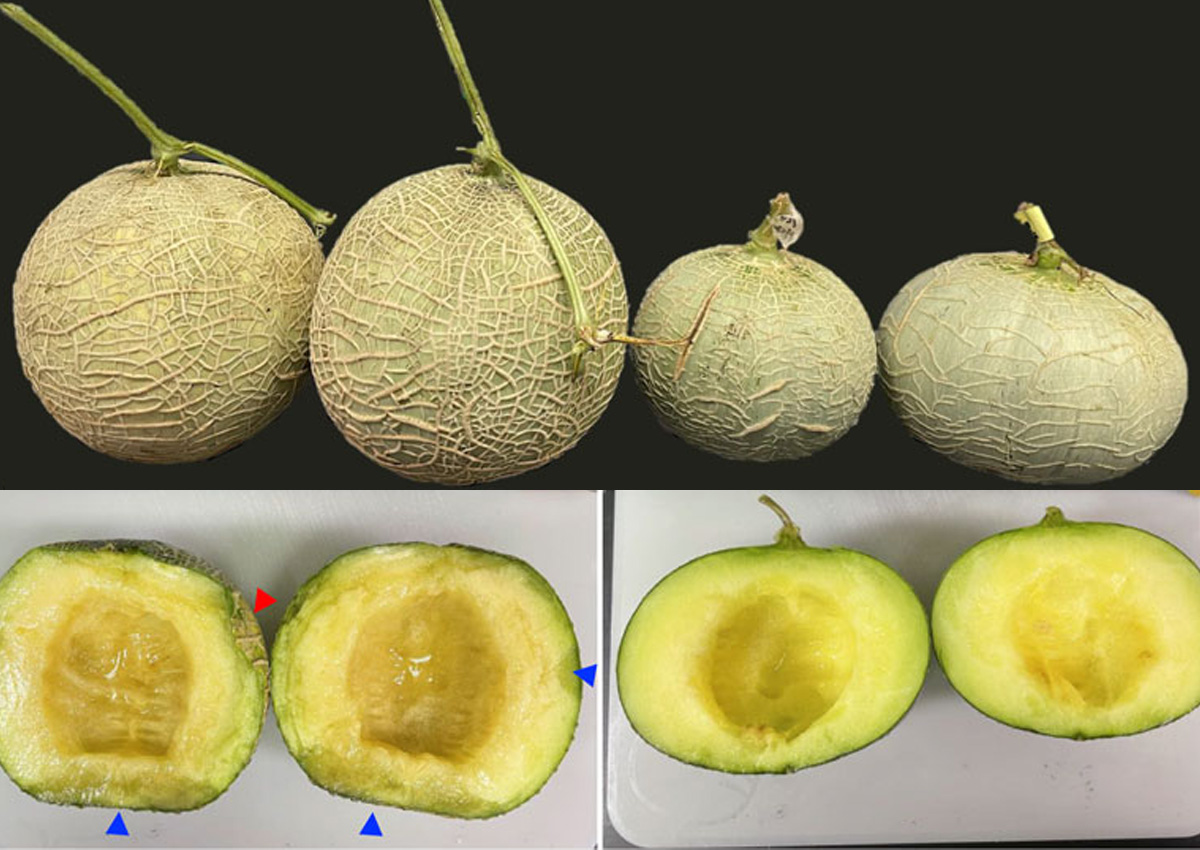
Researchers Modify Shelf-Life of Japanese Luxury Melon Using CRISPR-Cas9
July 27, 2023| |
Researchers from the University of Tsukuba in Japan used CRISPR-Cas9 to modify the ethylene synthesis pathway in Japanese luxury melon (Cucumis melo var. reticulatus "Harukei-3") to increase its shelf life. The gaseous plant hormone ethylene has been long known to promote fruit ripening and play a certain role in the shelf-life of fruits. Extending the shelf-life of fruits decreases food loss and waste and contributes to global food security.
The enzyme 1-aminocyclopropane-1-carboxylic acid oxidase (ACO) is associated with the final step of the ethylene production pathway and has multiple homologous genes. The research group from the University of Tsukuba has previously demonstrated five CmACO genes (homologous genes of ACO) in the melon genome and shown that the CmACO1 gene is predominantly expressed in the harvested fruit. Therefore, CmACO1 would be an important gene for enhancing the preservation of the melon fruit. The researchers selected CmACO1 as a target of gene editing and attempted to introduce mutations in the gene.
The harvested melons did not show any foreign genes and the mutations induced were inherited for at least two generations. In the non-gene-edited line (wild type), ethylene generation was observed in the fruit 14 days postharvest, the rind turned yellow, and the flesh softened. However, in the genome-edited melons, ethylene generation was reduced to one-tenth of that in the wild type, with the skin color remaining green and the fruit remaining firm, indicating that introducing CmACO1 mutation via gene editing enhanced the shelf life of the melons. The results of this study indicate that gene editing can contribute to food loss reduction and improve food security.
For more details, read the article in the University of Tsukuba Research News and the original research article in Frontiers in Genome Editing.
| |
You might also like:
- Melon Transformation Made Easier and More Efficient
- Researchers Identify Three Genes Involved in Melon Ripening
- Scientists Discover Ancient Melon Key in Breeding Disease-Resistant Watermelons
Biotech Updates is a weekly newsletter of ISAAA, a not-for-profit organization. It is distributed for free to over 22,000 subscribers worldwide to inform them about the key developments in biosciences, especially in biotechnology. Your support will help us in our mission to feed the world with knowledge. You can help by donating as little as $10.
-
See more articles:
-
Gene Editing Supplement (July 27, 2023)
-
Research and Tools
- Experts Publish Proposed Applications of Genetic Targeting Technologies
- Remodeling Rice Cell Walls Boosts Lodging Resistance, Biomass Saccharification, and Cadmium Resistance
- CRISPR Helps Scientists Develop Canker-resistant Citrus Lines in Less Than a Year
- “Weeping” Gene and CRISPR Combo Can Boost Apple Fruit Production
- Researchers Modify Shelf-Life of Japanese Luxury Melon Using CRISPR-Cas9
-
Policy Considerations and Approvals
- EU Ministers Discuss Proposal on NGTs for the First Time
-
Read the latest: - Biotech Updates (February 18, 2026)
- Gene Editing Supplement (January 28, 2026)
- Gene Drive Supplement (February 22, 2023)
-
Subscribe to BU: - Share
- Tweet

